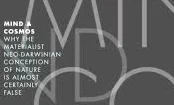Poverty of Spirit
January 26, 2013
A review of Mind and Cosmos by Thomas Nagel
SOME REVIEWERS of Thomas Nagel’s latest attack on the theory of natural selection, Mind and Cosmos, seem to suggest that the book deserves to be taken seriously: I am not one of them.
Nagel has spent a lot of time arguing for a form of “spirit”, trying to demonstrate that human consciousness is “irreducible” to the brain and to all the ways we have learned to describe the brain’s physical processes. This has left him with the rather cumbersome and dissatisfying theory of “neutral monism”, favoured by the likes of William James. His new book is an extension of this theme, suggesting that there is no way that consciousness can conceivably be created from Darwinian natural selection. In fact, he finds it intuitively implausible. As it happens, I don’t, though I used to. That’s the problem with relying on intuition: it varies with the individual and changes over time.
Over hundreds of pages, Nagel explains how he cannot personally conceive of a way that the random mutation and natural selection of genes over eons of time can lead to something as complex and mysterious as consciousness. If he cannot personally conceive of such a way, he thinks it must be because it is wrong, and so he gets himself in a muddle and proposes the idea that evolution is driven by something “teleological” hidden in the heart of the universe. Now, there are problems when it comes to teleology too, mainly that it is evidence of wishful thinking, but also that it is largely in the eye of the beholder. If elephants had any opinion on the matter, they would probably think the universe was designed to ensure that highest forms of life develop long trunks. The truth is that the overwhelming majority of organisms don’t have what we think of as consciousness at all and show no signs that they are inching incrementally towards it.
The sheer scarcity of consciousness would actually back up the Darwinian explanation: it is a testament to the presence of a few billion years of uniquely propitious conditions for one particular genetic lineage, rather than the terminus of some process of intelligent design. That we happen to be that favoured genetic lineage may seem at first glance to be an uncommon stroke of luck that requires a better explanation than the one offered by Darwin. Nagel seems to suggest that the fact that we have become perceptive and creative enough to come up with the Theory of Natural Selection proves beyond doubt that Natural Selection is not sufficient to explain how perceptive and creative we have become.
Nagel is guilty of an ex post facto statistical fallacy so beloved of believers in destiny. There were a billion billion billion possible permutations across a billion generations of life, and the odds of it creating the precise details of contemporary Earth are mindblowing, but something had to happen, and something – in this case, humans and several million other extant species - had to be the consequence of this unthinkable lottery of time and space. If we weren’t the consequence, we wouldn’t be here to examine it with the sort of heady mixture of reverence and muddleheadedness that has overwhelmed Thomas Nagel.
There are also elements of the genetic fallacy as he argues that consciousness as it exists today would – on purely Darwinian terms - have served no purpose for more primitive beings. Of course, just because our minds weren’t “naturally selected” a million years ago to write sonnets or equations doesn’t mean that we should properly be disqualified from doing so. As can be proved by countless example, there is no reason why the products of natural selection cannot be repurposed over time during a process of runaway sexual selection and cultural evolution combined with the Baldwin Effect. Suffice it to say, none of this needs the addition of some mysterious “teleological” force in order to make the sums work.
Nagel also seems to borrow the old creationist line about there not being enough time for something so complex to evolve. The London Review of Books reviewer got it spot on here:
This area is one in which intuitions are worth nothing, though that has rarely deterred the sceptics.
Still, it is hard to know what, Nagel, a professed atheist, is trying to prove, and why the atheist-materialist-Darwinist worldview seems to irk him so much. Or actually, maybe it isn’t that hard to know, given that I used to have similar anxieties, driven in part by my slightly superstitious affinities with the old existence-precedes-essence dictum of Sartre. It upset me to think that I was part of a deterministic system, but that upset now seems to me to be rather juvenile.
I have absolutely no difficulties explaining myself as a purely physical being and a product of purely physical processes. What we have, in consciousness, is messy and inconsistent, prone to error and fantasy and unable to deal properly with notions of probability and agency, leading it to posit unseen forces in the universe. There is no reason to treat those inconsistencies and incapacities and blind spots with any sort of reverence. We need not be under the impression that our foolishness denotes a higher reality, that our cave is more comfortable or our flybottle more representative of the Truth. Just because we are stupid doesn’t mean stupidity is the Truth either, however reassuring it might be to think so.





